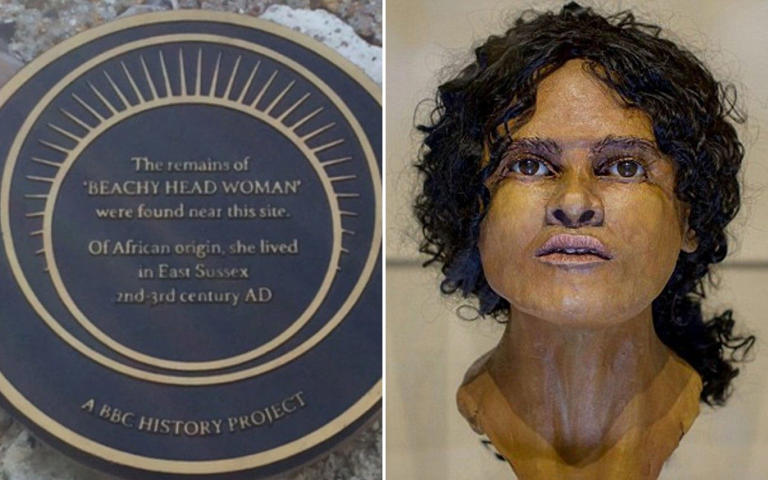A BBC plaque celebrating the “first black Briton” has been removed due to scientific evidence suggesting that she was not of African origin.
The sign, honouring the 1,800-year-old remains of the “Beachy Head Lady,” a female believed to be of African origin, was erected in an East Sussex village as part of the 2016 Black and British series presented by historian Prof David Olusoga.
The Telegraph can reveal that the plaque, celebrating what a BBC documentary billed as the earliest “black Briton,” has now been removed.
DNA analysis conducted by The Francis Crick Institute revealed that Beachy Head Lady's origins were in “southern Europe – most likely Cyprus,” according to an article by the researcher who initially studied her remains.
Parish councillors in the village of East Dean, where archaeologists discovered the remains of Beachy Head Lady, voted to take down the plaque that had been installed at a cricket pavilion.
Africa or Cyprus? The BBC History project plaque, now understood to be in storage at the cricket club, read: “The remains of Beachy Head Woman were found near this site. Of African origin, she lived in East Sussex 2nd-3rd century AD.”
The claim about her origins was made in Prof Olusoga’s documentary series Black and British: A Forgotten History, which told the story of the “enduring relationship between Britain and people whose origins lie in Africa”. In episode one of the series, Beachy Head Lady was presented as “sub-Saharan African in origin”, and the program featured a reconstruction of her features.
Prof Olusoga remarked that “she’s a black Briton,” as Jo Seaman, an expert archaeologist, explained that her African origins and the age of her remains likely made her the “earliest black Briton.”
As part of the BBC series, plaques commemorated black Britons throughout history.
An article by Mr Seaman, a Beachy Head expert who carried out initial research into the remains, was updated in 2022 to include the note: “DNA analysis has since concluded that although she grew up in Eastbourne, the place of her ancestry is in southern Europe – most likely Cyprus.”
An online message from the Beachy Head Story, a dedicated visitors’ centre, also stated, "The place of her ancestry is in southern Europe.”
Following a complaint by a resident of East Dean and Friston Parish in light of the research, the council tabled a motion to remove the plaque in the autumn of 2022.
Debate over Britons’ ethnic make-up There has been recent controversy over the purported ethnic make-up of Britain, and a book titled Brilliant Black British History was recently criticized for its claims about ancient populations.
The children’s book by Nigerian-born British author Atinuke claimed that “every single British person comes from a migrant” but “the very first Britons were black.”
The book, published by Bloomsbury and promoted by Arts Council-funded literacy charity The Book Trust, further claimed that “Britain was a black country for more than 7,000 years before white people came, and during that time the most famous British monument was built, Stonehenge.”
Genetic studies have shown that the inhabitants of Britain in the period when Stonehenge was completed, around 2,500 BC, were pale-skinned early farmers whose ancestors had spread from Anatolia.
Researchers have said it is difficult to know with certainty what the earlier hunter-gatherer inhabitants of Britain looked like.


